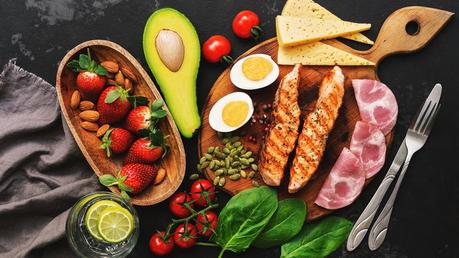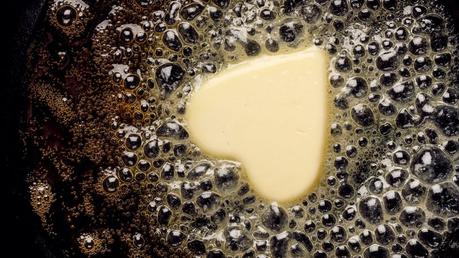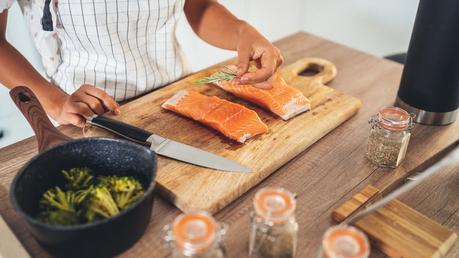- What are high-protein diets?
- Is keto the "wrong" way to lose weight?
- Will a focus on higher protein make food choices for weight loss more complicated?
- What does it mean to use fat for flavor?
- Is a higher protein, low-carb diet more effective for weight loss than a keto diet that emphasizes high fat?
- Is a higher protein intake right for me?
- Can you eat too much protein?
- Does excess protein turn to sugar?
- Will eating more protein kick me out of ketosis?
- Don't I need to add more fat to my keto diet in order to feel full?
- Don't I need to add extra fat to my keto diet in order to be in ketosis and burn fat?
- What do higher protein recipes and meal plans look like?
- Does this mean I'll be eating tasteless "diet food"?
- Is a higher protein diet more expensive?
- Will it mean more cooking?
- What is "protein percentage"?
- What is "satiety per calorie"?
- What is "energy density"?
- Why is DD expanding its options to include high-protein recipes and meal plans?
- Why is Diet Doctor now talking about calories?

1. What are high-protein diets?
The recommended daily allowance (RDA) for protein is 0.8 grams per kilo, an amount set by the US Institutes of Medicine. This amount is the minimum requirement to prevent malnutrition, not to improve health.
For an average male, that's 56 grams of protein per day - about 6 ounces of steak. For an average female, it's 46 grams per day.
We define high protein as over 1.2 grams per kilo per day or more than 20% of calories - which is really just adequate protein, but above the RDA. We recommend that most people aim for 1.2 to 2 grams of protein per kilo or 20-35% of calories from protein.
By comparison, American men average 88 grams of protein per day, and women average 66 grams. This equates to only 14 to 16% of total calories, far less than our definition of high protein intake. Of those protein calories, approximately 30% come from plant sources.
Since you may be consuming a lower amount of protein, you may consider our recommendation for adequate protein to be "high," so we refer to these diets as high-protein diets.
2. Is keto the "wrong" way to lose weight?
There are many ways to lose weight in a healthy way, and a very low-carbohydrate, ketogenic diet can be one of them.
All healthy weight loss diets have a few things in common. Any healthy weight loss diet should:
- provide your body with plenty of protein, plus essential nutrition from vitamins, minerals, and fatty acids.
- provide enough calories for energy but somewhat less than daily needs in order to allow for weight loss.
- reduce metabolically unhealthy body fat while preserving or building appropriate muscle and bone mass.
- maintain or improve energy levels and sense of well-being.
- improve health markers such as glucose, lipids, waist circumference, and blood pressure.
- not inappropriately reduce your basal metabolic rate.
If your keto diet does all of these, as it does for many people, it's the right diet for you.
But a keto diet combined with higher amounts of protein may be even more effective for some people. At least one small clinical trial in men with obesity, where participants were allowed to eat as much as desired, shows that a ketogenic diet combined with higher protein resulted in more weight loss and less hunger compared to a higher protein diet with a moderate amount of carbohydrates.
3. Will a focus on higher protein make food choices for weight loss more complicated?
A focus on protein intake doesn't have to mean more tracking or counting. Keeping track of your protein intake may be helpful at first, for a week or so, because many people do not have an accurate sense of how much protein they are consuming.
However, you can always keep it simple with these three steps:
- Reduce carbohydrates to 20 to 50 grams per day, or whatever level allows you to lose weight comfortably.
- Have a generous serving of protein at every meal, at least one to two palm-sized servings of high-protein foods, such as eggs, meat, fish, or poultry.
- Add fat to your meals for flavor, just enough to make sure you enjoy the foods you're eating. This means you can keep the skin on your chicken and add butter to your vegetables as you wish.
You may also need to add some fat to make up part of the calories lost when reducing carbohydrate foods - but with twice as many calories as carbs, not much fat is needed!
If this approach doesn't help you move toward your weight loss and health goals, you may want to try tracking protein, carbohydrates, fat, and calories for a short while in order to get a better sense of what you can tweak for more success.
Or you can use our higher protein recipes that do the calculations for you. For even more structure to your higher-protien diet, you can use our meal plans, which are available with a free trial membership.
At Diet Doctor, we will continue to develop visual guides, informative videos, and other resources to make eating a higher -protein diet easy and accessible.
4. What does it mean to use fat for flavor?

Chefs know that fat carries the flavor of food to your taste buds. Food without fat can be tasteless and dry. This is why food manufacturers added sugar to many foods during the low-fat diet days - to make up for the loss of taste that came with removing fat.
In order for a way of eating to be sustainable, it also has to be enjoyable. Adding fat for flavor means you can put butter or cheese sauce on vegetables that would be bitter or boring otherwise. You can add a rich sauce to lean pork loin or chicken breast to bring out flavor and avoid dryness.
The key to using fat for flavor is not to drown your food in fat so that all you taste is butter, cheese, or mayonnaise. Instead, use just enough to enhance your enjoyment of the food itself.
5. Is a higher protein, low-carb diet more effective for weight loss than a keto diet that emphasizes high fat?
The truth is that we don't know for sure if a higher protein, low-carb diet is more effective for healthy weight loss than a keto diet that emphasizes high fat. Not enough head-to-head trials exist to answer that question. But for some people, a higher protein low-carb diet may be the better choice.
A diet that is higher in protein may be more effective for achieving and maintaining weight loss due to increased feelings of fullness and an improved body composition that favors preserving muscle mass during weight loss.
A diet that is higher in protein is likely to be higher in nutrition in general. With a high-protein approach, you will get all the nutrients you need to keep muscles, bones, and metabolism in good shape.
A keto diet that emphasizes fat intake rather than protein may not be as effective in supplying the body with adequate essential nutrition with a lower calorie intake. Refined forms of fat - such as butter and olive oil - add a lot of calories without a lot of nutrition. While added fat may help many people with satiety, the added fat may prevent some people from maintaining a sustainable calorie deficit.
Even though counting calories is frequently not a sustainable approach to weight loss, calories still count in losing and maintaining weight loss. With a higher protein diet, you may be more able to make every calorie count towards essential nutrition and a healthy metabolism.
But, as we have mentioned before, if you are eating a keto diet emphasizing added fats and you are getting adequate nutrition, managing your hunger, and succeeding with your healthy weight loss goals, then there is no need to change your eating habits. Keep up the great work!
6. Is a higher protein intake right for me?

If you are having continued success on your low-carb or keto diet as it is, you may not need to make any changes. However, if you have had an extended stall in your weight loss journey with more weight to lose, or if you have started regaining lost weight, you may want to consider a higher protein approach.
If you are interested in changing your body composition to build muscle and reduce body fat, a higher protein approach may be more effective than a traditional keto diet.
If you love protein-rich foods and you don't enjoy the higher fat content of a keto diet, you might prefer a higher protein approach. Having meals that are enjoyable will help you succeed in reaching your health goals.
If you want more flexibility in food choices, a higher protein, lower fat diet might be right for you. By increasing protein and cutting back on fat, you may find that you can add some fruit, legumes, or whole grains to your meals and still lose weight.
However, if you are eating a keto diet for reasons other than weight loss, such as mental health or neurological benefits, then reducing fat and eating more protein may not be right for you. If you are using a keto diet as part of a medical treatment program, please consult with your doctor before making any changes.
7. Can you eat too much protein?
There is a possibility that one could eat "too much" protein, but it would be very difficult to do in actuality.
The Acceptable Macronutrient Distribution Range (AMDR) set by the US Institute of Medicine is 10 to 35% of calories. At the higher end, 35% protein for a daily caloric intake of 2,000 calories is 175 grams of protein. If your calorie needs are higher, then your protein intake might be higher as well.
The theoretical maximum safe intake for liver and kidney function is a diet with around 70% protein. For a person who is 176 pounds (80 kilos), this would be 365 grams of protein per day. It is unlikely that, under normal circumstances, anyone would overeat protein to this extent.
8. Does excess protein turn to sugar?
In order to answer that question, we would first have to know what your body considers to be "excess" protein.
If you have been chronically undereating protein and you increase your intake, your body will likely put nearly all dietary protein to good use building muscle, bone, and other essential tissues, hormones, and enzymes. You may feel like you are eating "too much" protein, but your body may disagree!
In fact, older adults may have higher protein needs. Individuals with obesity, prediabetes, or type 2 diabetes may also benefit from a diet that is higher in protein. Additionally, your gut can regulate the timing of the release of amino acids into the bloodstream, temporarily storing some and releasing them later. The gut itself will use more amino acids when they are plentiful and less when they aren't.
Both mechanisms serve to make sure the body gets just the right amount of amino acids it needs, even when intake of protein varies. As a result, your body is less likely to have an "excess" of amino acids.
Overall, dietary protein doesn't contribute much to the production of of glucose. While some amino acids can be converted into glucose, some organs, tissues, and cells in the body require glucose. That glucose will come mainly from glycogen stores, but it can also come from what little glucose may be produced from protein.
The bottom line is that in our clinical experience, "excess" protein intake is far less of a problem than inadequate protein intake, which can lead to muscle and bone loss, as well as a slowing of your metabolism.
9. Will eating more protein kick me out of ketosis?

It might, briefly. Protein does cause more of a rise in insulin than fat.But if your goal is to lose weight, this may not matter to a significant degree. Achieving a certain ketone level may be beneficial for other health reasons, but is not necessary for weight loss.
Ketosis is an outcome of fat metabolism; ketones don't cause your body to burn fat. In other words, there's no need to add "extra" fat to your food to reach a particular level of ketosis if your primary health goal is weight loss.
10. Don't I need to add more fat to my keto diet in order to feel full?
The answer to this question will vary by individual. However, calorie for calorie, protein foods and high-fiber vegetables are better than fat at helping your body to feel full with fewer calories. That doesn't mean fat can't also help you feel full. It definitely can. But fat provides more than twice as many calories per gram as does protein or carbs. So, protein and fiber-filled foods may help you feel full with fewer calories than fat.
If you are experiencing hunger between meals, make sure each meal has:
- Plenty of protein: You may need more than you think you do. Most people will do well with 25 to 35 grams of protein per meal. This is the equivalent of four eggs! So if you think a "high-protein" meal is two eggs, you are only halfway there.
- High-fiber vegetables: Fiber slows down digestion and provides bulk that stretches the stomach to signal fullness. Find creative ways to include vegetables at every meal, including breakfast.
- Adequate calories: If you are not getting enough calories, you may need to add fat to your meals. But remember that fat has nine calories per gram (compared to protein and carbs, which have four), so a little bit of fat can add up to a lot of calories quickly.
Also, keep in mind that fat plus a sweet taste can stimulate your brain's food reward centers. Fat combined with a keto-friendly, non-caloric sweetener can promote hunger, override feelings of fullness, and make it easy to overeat empty calories.
11. Don't I need to add extra fat to my keto diet in order to be in ketosis and burn fat?
A keto diet works because it lowers carbohydrate intake to a level where the body shifts to burning fat for fuel instead of glucose. Lowering carbohydrate intake automatically raises the fat percentage of the diet, but you may - or may not - increase the absolute amount of fat that you eat.
Carbohydrate reduction is what increases the body's ability to burn fat in general - both dietary and body fat. Keeping fat intake at the right level for you increases the body's ability to burn its own fat. This level may vary from person to person.
If you keep your insulin low by eating fewer carbs - but keep your calorie intake higher than you need - you can limit the body's ability to burn its own fat for fuel.
Ketones are an outcome of burning fat. Achieving a certain ketone level may be beneficial for other health reasons, but is not necessary for weight loss.
12. What do higher protein recipes and meal plans look like?
Higher protein recipes and meal plans will focus first on providing essential nutrition, especially protein. They will avoid adding a lot of calories from fat and will ensure that calorie levels of recipes and meal plans (which are available through a free trial membership) are appropriate for weight loss.
Keep in mind, however, that our recipes that are lower in fat are still a long way away from "low fat." For example, some recipes may have 60% fat calories instead of 75%. That's still plenty of fat for you to enjoy!
For our higher protein recipes, we will continue to offer three levels of carbohydrate reduction: keto (10 grams of carbs or fewer per recipe); moderate (20 grams or fewer); and liberal (35 grams or fewer).
By targeting foods that are high in protein and other nutrients, our recipes and meal plans will help you meet your essential nutrition needs and keep you feeling full, which can help you lose weight.
But don't worry. Our recipe team will make sure recipes that are high in protein are also still delicious. Additionally, we're working to bring you recipes for tasty snacks and desserts that will help you to up your protein intake without a lot of extra calories.
Start your 30-day FREE trial and get access to the following high-protein meal plan:
13. Does this mean I'll be eating tasteless "diet food"?
A high-protein, low-carb or keto diet is still high in fat. With 5 to 10% of calories from carbohydrates and 30 to 35% of calories from protein, that still means that about 60% of calories will come from fat. That allows for plenty of fat to be added to make food taste good.
14. Is a higher protein diet more expensive?
It is true that protein foods tend to be more expensive than other foods at the grocery store. But smart food choices can keep your grocery bill under control even when eating a higher protein diet.
Some things you can do to make sure you are getting the most out of your grocery dollar:
- Shop weekly sales at your grocery store.
- Buy in bulk and freeze the extra for later use.
- Choose less expensive cuts, including ground meats.
- Include eggs, an inexpensive and versatile form of protein.
- Consider adding legumes, if your carb tolerance allows, as beans are an inexpensive source of protein.
15. Will it mean more cooking?

It may take a little planning, but even high-quality protein sources can be grab-and-go convenient.
Try hard-boiling a dozen eggs for quick protein anytime. Leaner deli meats, such as sliced turkey or ham, can be paired with a slice of cheese and rolled around a pickle spear for lunch on the go. Grab a rotisserie chicken from the grocery store, and you'll have chicken chunks to add to salads, soups, or casseroles that need a protein boost.
We have a list of 21 high-protein snacks to make getting your daily dose of protein quick and easy.
And, although we don't recommend relying on them every day, prepackaged protein shakes and fast-food burgers minus a bun can help you meet your protein goals when you are traveling or in a hurry.
16. What is "protein percentage"?
The "protein percentage" of a food reflects how much protein contributes to a food's total calories, excluding calories from fiber.
Fiber calories aren't included because fiber isn't broken down and absorbed by your digestive tract, unlike other carbohydrates. Therefore, fiber doesn't provide your body with calories.
17. What is "satiety per calorie"?
Satiety per calorie essentially means how full you feel compared to how many calories you've eaten. To lose weight, you want to feel as full as possible with the least amount of calories. High-protein foods - such as salmon, chicken breast, and lean steak - provide the greatest satiety per calorie, along with low "energy density" foods like fiber-filled veggies because of their higher volume, fiber, and water content.
These food have a low satiety value per calorie:
- High energy density foods, such as high-carb/high-fat ultra-processed foods, like donuts and chips
- Refined fats that are removed from naturally occurring protein, such as butter and oils
- Non-caloric sweetener-containing foods combined with refined fats
Sugar-sweetened foods are considered low-satiety, even if they are not high in calories, as they are more likely to trigger cravings.
For healthy weight loss, food choices should be high satiety per calorie. The goal is to reduce hunger with the fewest calories. Dramatically reducing carbohydrates is a good strategy for increasing satiety per calorie, as long as excessive fat is not added.
18. What is "energy density"?
Energy density is the amount of energy or calories in a specific weight of food. It is usually expressed as calories per gram.
In most cases, foods with lower energy density are better for weight loss as they contain fewer calories per gram of food. Low energy-density foods allow us to eat a greater volume which adds to satiety.
For people dealing with insulin resistance, foods that are both low in energy and low in digestible carbohydrates - such as high-fiber, low-starch vegetables - are excellent choices for weight loss.
However, energy density is only one factor in losing weight in a healthy way. You must still make sure you get the nutrients you need. While a lot will come from vegetables, you'll also need high-protein foods to supply essential amino acids. You can get the protein you need from animal sources or from plant sources.
19. Why is DD expanding its options to include high-protein recipes and meal plans?
We know that most visitors come to our site for help with weight loss and we want to guide these individuals on how to lose weight in the healthiest way possible. Evidence indicates that higher-protein weight loss diets help preserve muscle, bone, and metabolic health. We believe that a focus on protein intake is an important part of healthy weight loss.
Additionally, we know that some visitors to our site experience a lack of progress on keto, and we want to make sure that we offer other healthy options for success, rather than just telling those individuals to "keto harder."
If you are doing keto, and it's working well for you, that's great! If not, we think we have the solution. Increasing protein may help carbohydrate reduction work even better.
At Diet Doctor, we have an obligation to re-evaluate our guidance in light of new information and a new understanding of existing information.
Furthermore, our re-evaluation of existing studies has prompted us to rethink the importance of protein's role in weight loss and metabolic health.
Clinical trials that show that carbohydrate reduction is beneficial for weight loss usually also feature an increase in protein or protein percentage. Higher-protein diets appear to work well for weight loss and improved metabolic health, even in the absence of dramatic carbohydrate reduction.

